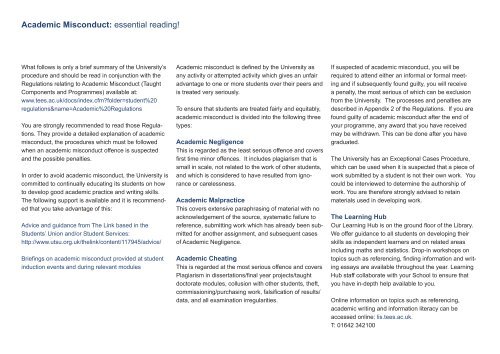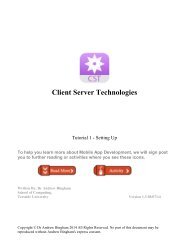15|16
You also want an ePaper? Increase the reach of your titles
YUMPU automatically turns print PDFs into web optimized ePapers that Google loves.
Academic Misconduct: essential reading!<br />
What follows is only a brief summary of the University’s<br />
procedure and should be read in conjunction with the<br />
Regulations relating to Academic Misconduct (Taught<br />
Components and Programmes) available at:<br />
www.tees.ac.uk/docs/index.cfm?folder=student%20<br />
regulations&name=Academic%20Regulations<br />
You are strongly recommended to read those Regulations.<br />
They provide a detailed explanation of academic<br />
misconduct, the procedures which must be followed<br />
when an academic misconduct offence is suspected<br />
and the possible penalties.<br />
In order to avoid academic misconduct, the University is<br />
committed to continually educating its students on how<br />
to develop good academic practice and writing skills.<br />
The following support is available and it is recommended<br />
that you take advantage of this:<br />
Advice and guidance from The Link based in the<br />
Students’ Union and/or Student Services:<br />
http://www.utsu.org.uk/thelink/content/117945/advice/<br />
Briefings on academic misconduct provided at student<br />
induction events and during relevant modules<br />
Academic misconduct is defined by the University as<br />
any activity or attempted activity which gives an unfair<br />
advantage to one or more students over their peers and<br />
is treated very seriously.<br />
To ensure that students are treated fairly and equitably,<br />
academic misconduct is divided into the following three<br />
types:<br />
Academic Negligence<br />
This is regarded as the least serious offence and covers<br />
first time minor offences. It includes plagiarism that is<br />
small in scale, not related to the work of other students,<br />
and which is considered to have resulted from ignorance<br />
or carelessness.<br />
Academic Malpractice<br />
This covers extensive paraphrasing of material with no<br />
acknowledgement of the source, systematic failure to<br />
reference, submitting work which has already been submitted<br />
for another assignment, and subsequent cases<br />
of Academic Negligence.<br />
Academic Cheating<br />
This is regarded at the most serious offence and covers<br />
Plagiarism in dissertations/final year projects/taught<br />
doctorate modules, collusion with other students, theft,<br />
commissioning/purchasing work, falsification of results/<br />
data, and all examination irregularities.<br />
If suspected of academic misconduct, you will be<br />
required to attend either an informal or formal meeting<br />
and if subsequently found guilty, you will receive<br />
a penalty, the most serious of which can be exclusion<br />
from the University. The processes and penalties are<br />
described in Appendix 2 of the Regulations. If you are<br />
found guilty of academic misconduct after the end of<br />
your programme, any award that you have received<br />
may be withdrawn. This can be done after you have<br />
graduated.<br />
The University has an Exceptional Cases Procedure,<br />
which can be used when it is suspected that a piece of<br />
work submitted by a student is not their own work. You<br />
could be interviewed to determine the authorship of<br />
work. You are therefore strongly advised to retain<br />
materials used in developing work.<br />
The Learning Hub<br />
Our Learning Hub is on the ground floor of the Library.<br />
We offer guidance to all students on developing their<br />
skills as independent learners and on related areas<br />
including maths and statistics. Drop-in workshops on<br />
topics such as referencing, finding information and writing<br />
essays are available throughout the year. Learning<br />
Hub staff collaborate with your School to ensure that<br />
you have in-depth help available to you.<br />
Online information on topics such as referencing,<br />
academic writing and information literacy can be<br />
accessed online: lis.tees.ac.uk.<br />
T: 01642 342100



